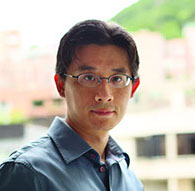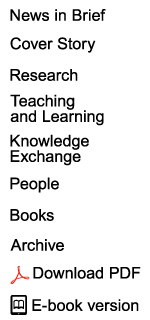
The Night Revels of Han Xizai, original by the 10th-century Chinese artist Gu Hongzhong of the Southern Tang.

CULTURAL MUSINGS ON
THE DINNER TABLE
Dr Isaac Yue of the School of Chinese has been considering the cultural significance of foods in China’s past and present.

![]() Anywhere in the world you will notice
Anywhere in the world you will notice
this pattern in which people don’t eat
specific foods not because of the taste,
but because of the ideas associated
with them. ![]()
Dr Isaac Yue
Dr Isaac Yue uses food as a vehicle to travel to the past and bring ancient times back to life. Ironically, it would have been difficult for him to openly pursue this interest in times past because of the Confucian precept that men of virtue should steer clear of the kitchen.
“That saying was misinterpreted over time [it originally applied only to the slaughterhouse], but it became so widely accepted, that if men wrote down recipes they did it in private, in secret, because they didn’t want people to know,” Dr Yue said.
Fortunately for Dr Yue, enough Chinese sages were secretly interested in food that there are written recipes dating back to the Tang Dynasty. Recipes have even crept into classical literary texts. Taken together, these snippets provide insights into the status and preparation of food over time.
For example, pork was shunned at one point during the Song Dynasty, despite its centrality to Chinese cuisine before and after. Lamb had come into favour instead under the influence of the north and because it was more difficult and costly to obtain.
“In one particular menu from that period, we know the emperor was a guest at a general’s household. Pork was not served on the emperor’s table, but it was served on the other tables. They were ranking food,” he said.
“Anywhere in the world you will notice this pattern in which people don’t eat specific foods not because of the taste, but because of the ideas associated with them.”
Tastes of long ago
Dr Yue is also interested in the elaborate preparations of certain dishes. In The Golden Lotus there is a detailed description about a pig’s head cooked using one log to control the fire and keep it at a low temperature, and in Dream of the Red Chamber of fetching mountain snow to make tea.
Dr Yue’s interest in food is not confined to ancient China. He has also been studying the first Western recipe book written in China, by the missionary Martha Crawford of Alabama in the mid-19th century. It instructed servants how to make beef stew, carrot cake and other foods for their Western employers, and also found an audience among Chinese readers interested in these new foods.
“Usually when we study history, we look at dead people. But food is something that can be brought back to life. I am asking, is what we eat today the same as what we ate 100 years ago?” said Dr Yue. Apart from reading about food, he has also tested some of the recipes in his modern kitchen and found they stand up. Men can cook.

